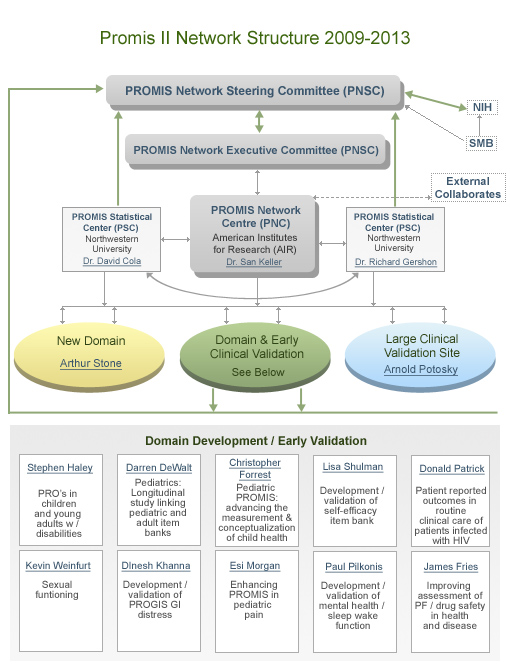Program Snapshot
The Common Fund’s Patient-Reported Outcomes Measurement Information System (PROMIS) program created new paradigms for how clinical research information is collected, used, and reported. PROMIS addressed a need in the clinical research community for a rigorously tested patient reported outcome (PRO) measurement tool that uses recent advances in information technology, psychometrics, and qualitative, cognitive, and health survey research to measure PROs such as pain, fatigue, physical functioning, emotional distress, and social role participation that have a major impact on quality-of-life across a variety of chronic diseases. For current information about PROMIS, please visit the HealthMeasures website.
The PROMIS (Patient-Reported Outcomes Measurement Information System) initiative developed new ways to measure patient-reported outcomes (PROs), such as pain, fatigue, physical functioning, emotional distress, and social role participation that have a major impact on quality-of-life across a variety of chronic diseases. Clinical measures of health outcomes, such as x-rays and lab tests, may have minimal relevance to the day-to-day functioning of patients with chronic diseases. Often, the best way patients can judge the effectiveness of treatments is by changes in symptoms. The goal of PROMIS was to improve the reporting and quantification of changes in PROs.
This initiative applied to a wide range of disorders including cancer, congestive heart failure, depression, arthritis, and multiple sclerosis, as well as chronic pain conditions. PROMIS created new paradigms for how clinical research information is collected, used, and reported. The PROMIS initiative addressed a need in the clinical research community for a rigorously tested PRO measurement tool that utilized recent advances in information technology, psychometrics, and qualitative, cognitive, and health survey research.
The PROMIS program developed, tested, and implemented a reporting system to collect and quantify clinically important outcomes such as pain, fatigue, physical functioning, emotional distress, and social role participation. During the first phase of the initiative, PROMIS formed a network of researchers that developed questions or "items" to analyze five outcomes or "domains." PROMIS created a psychometrically-robust computer adaptive testing (CAT) system, based on item response theory (IRT), to administer these items. In addition, it developed a web-based system to give clinical researchers access to the item banks and the CAT system. Whether administered through an iterative CAT system, that allows research flexibility, or by paper version short forms, PROMIS demonstrated improved efficiency and sensitivity in comparison with existing PROs. Long-term trials are planned to address issues of validity and sensitivity to change in clinical populations. The increased efficiency, flexibility, and sensitivity of PROMIS holds potential to become a widely-accepted, standardized PRO measurement tool that will allow greater comparability of studies, with reduced burden on patients.
The second phase of the PROMIS initiative continued to advance the field of patient self-reporting in clinical research and practice. This phase:
- developed new items and domains,
- translated items and domains into other languages such as Spanish and Chinese to facilitate international studies;
- conducted validation studies in large-scale clinical trials in a variety of clinical populations;
- made PROMIS tools accessible to a wider range of clinical researchers and patient-care communities, and optimized its usability for rapid adoption;
- provided education and outreach to familiarize users with new developments in PROMIS;
- improved PROMIS tools to allow for better outcomes in clinical trials, and, potentially, better individual and clinical decisions;
- engaged stakeholders at all levels, by interacting with other health-related federal agencies, forged new relationships with patients and patient organizations, and established public-private partnerships to sustain PROMIS once Common Fund support had ended.

Announcements
The Patient-Reported Outcomes Measurement Information Systems (PROMIS®) program has transitioned from the Common Fund. An original NIH Roadmap program, the goal of this 10-year project was to develop an efficient state-of-the-art assessment system for self-reported health. This program developed next generation patient-reported outcome (PRO) measures using large item banks and computerized adaptive testing, which allowed for well-organized and effective assessment of PRO in clinical research in a wide variety of chronic diseases.The second phase of PROMIS studies (PROMIS II), funded from 2009-2014, continued the agenda of PROMIS I (2004-2009), in addition to incorporating novel features that included longitudinal analyses and more socio-demographically diverse samples.
The second stage also involved increased emphasis on pediatric populations and evaluation of PROMIS item banks for clinical research and population science. The PROMIS program represented a paradigm shift in how assessments for PRO were created and used in clinical research.
PROMIS® is a publicly available system of highly reliable, precise measures of patient-reported health status for physical, mental, and social well-being. This web-based resource can be used to measure health symptoms and health-related quality of life domains such as pain, fatigue, depression, and physical function, which are relevant to a variety of chronic diseases, including cancer. PROMIS was successful in addressing the lack of standardization in patient-reported outcomes (PROs); although many ways to measures PROs existed, there had been little comparability among them.
PROMIS has had a substantial impact, with approximately 70 domains measuring pain, fatigue, depression, anxiety, sleep disturbance, physical function, social function, and sexual function, among other areas, available for use today. Measures were developed for children and adults, and has been translated into >40 languages (including English and Spanish). The work surrounding PROMIS has resulted in over 400 publications. More than 100 NIH grants have supported investigations using PROMIS instruments. PROMIS is available in a variety of forms, including paper and pencil, web and mobile platforms, as well as via electronic health record (EHR) data capture. Researchers both in the US and internationally are using PROMIS at accelerating rates, with substantial integration beginning in clinical settings.
PROMIS was supported by the NIH Common Fund from Fiscal Year 2004 through Fiscal Year 2014 and is presently supported through Fiscal Year 2019 by a trans-NIH cooperative agreement (U2C CA186878) led by the National Cancer Institute with funding from 12 other NIH Institutes and Centers. PROMIS tools are accessible through the HealthMeasures website and are available for use in clinical research and care.



